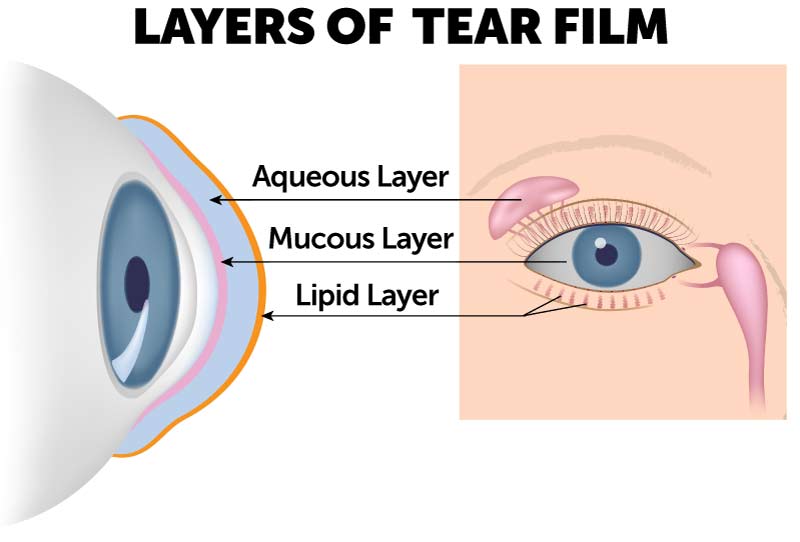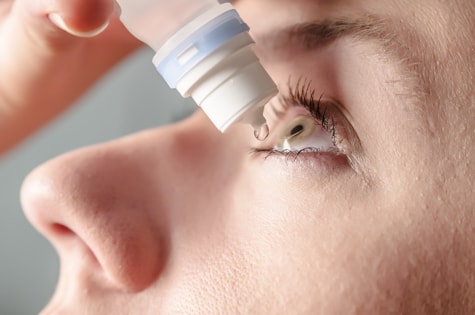Dry Eye Syndrome: Why are my eyes dry?
When your eyes are unable to stay properly lubricated, they may become dry. Dry eyes can increase your risk for an inflamed cornea (keratitis), cornea eye disease or eye infections such as pink eye (conjunctivitis), corneal ulcers and injuries, as well as vision disturbances. The most common symptom of dry eye syndrome is a scratchy or sandy feeling as if something is in the eye. Eye redness, blurriness, burning, itchiness, sensitivity to light and eye strain are also commonly reported symptoms.
The Importance of Tears for Your Eye Health
 The production, make-up, distribution and drainage of tears play an important role in keeping the surface of your eyes healthy. Tears are made of three main components: oil (lipid), water (aqueous) and mucin (mucous). Although seemingly simple, a tear’s composition is quite complex. An imbalance within or between the layer’s components can lead to the decreased production of tears. If these components are not in proper balance, the ocular surface will suffer from dry eye symptoms.
The production, make-up, distribution and drainage of tears play an important role in keeping the surface of your eyes healthy. Tears are made of three main components: oil (lipid), water (aqueous) and mucin (mucous). Although seemingly simple, a tear’s composition is quite complex. An imbalance within or between the layer’s components can lead to the decreased production of tears. If these components are not in proper balance, the ocular surface will suffer from dry eye symptoms.
Causes and Risk Factors of Dry Eyes
A number of biological and environmental factors trigger tear issues and cause dry eye. Dry eye may be a severe response to an environmental condition such as dry winter weather or a chronic condition known as dry eye syndrome. Some causes of dry eye syndrome include:
-
Aging – As we age, especially after age 50, our eyes produce fewer tears and the composition of tears changes, affecting the quality of the tears we produce.
-
Hormonal changes – Typically applicable to females, hormonal changes that accompany birth control pills, pregnancy and menopause can reduce tear production.
-
Medications – Anti-depressants, antihistamines, nasal decongestants and sedatives in addition to other prescription and over-the-counter medications may increase your risk for dry eye. For this reason, it is important to make your health care provider aware of all the medications you are taking.
-
Health conditions – Certain systemic diseases can affect the ability to make quality tears including Sjogren’s Syndrome, rheumatoid arthritis and other collagen vascular diseases known to make the body’s immune system attack itself.
-
Environmental factors – These include both indoor elements such as air conditioning and ceiling fans, as well as outdoor elements like dry or windy conditions. These environmental factors can increase the rate at which our tears evaporate.
-
Wearing contact lens – Contact lenses can intensify dry eye symptoms and make wearing contacts uncomfortable or even unbearable at times. In fact, dry eye symptoms are a main reason why many patients choose to go without contacts after so many years wearing them.
Best Treatment for Dry Eyes
The best treatment for dry eyes is unique to each individual. If you feel you may be suffering from dry eye, it is first important that you be evaluated by a cornea specialist. Dry eye symptoms left untreated can lead to corneal scarring and other corneal issues. Wolfe Eye Clinic has cornea experts throughout the state of Iowa. When you come in for your appointment, you will receive a comprehensive eye exam. During your exam, your cornea specialist may order additional advanced testing to further examine your tear concentration (osmolality) and quality (diagnostic staining), production (Schrirmer’s test), and rate of evaporation (tear film breakup time). From there, you and your cornea doctor can discuss possible dry eye treatment options in order to increase lubrication and reduce inflammation.
Eye Drops for Dry Eyes
If you’ve ever wondered, how can I hydrate my eyes? Artificial tears, a form of over-the-counter eye drops, is the best initial treatment. The best eye drops for  dry eyes are preservative-free artificial tears, which lubricate the eye. You will want to avoid using eye drops with preservatives or that claim they treat for red eyes. You will know whether drops have preservatives or not as the box may advertise “preservative-free” on the front. Artificial tears are available over-the-counter and do not require a prescription. No one drop formula works for everyone, so you may have to experiment to find the drop that works for you. If your eyes dry out while you sleep, a thicker ophthalmic gel or ointment can be prescribed by your doctor. For chronic dry eye as a result of an inflamed cornea (keratitis), a prescription eye drop may be prescribed by your eye doctor.
dry eyes are preservative-free artificial tears, which lubricate the eye. You will want to avoid using eye drops with preservatives or that claim they treat for red eyes. You will know whether drops have preservatives or not as the box may advertise “preservative-free” on the front. Artificial tears are available over-the-counter and do not require a prescription. No one drop formula works for everyone, so you may have to experiment to find the drop that works for you. If your eyes dry out while you sleep, a thicker ophthalmic gel or ointment can be prescribed by your doctor. For chronic dry eye as a result of an inflamed cornea (keratitis), a prescription eye drop may be prescribed by your eye doctor.
Punctal Plugs for Dry Eyes
One dry eye treatment you and your cornea specialist may explore is placing punctal plugs, also known as lacrimal plugs or occluders. Punctal plugs are tiny devices that are carefully inserted into the tear drain of the lower eyelid. This helps close the ducts that drain tears out of your eyes, thereby keeping tears on the ocular surface to improve lubrication. You typically do not see or feel the plug once it is placed as it is biocompatible and conforms to the shape of the punctum. Placement of punctal plugs is relatively quick, painless and can easily be done by your cornea doctor at your appointment. Anesthetic is not needed, and this procedure is almost always completed during your appointment in the clinic with your cornea doctor. While punctal plugs can be placed indefinitely, they are removable by your cornea specialist should it be needed. Occasionally, a punctal plug may fall out on its own if the eye is rubbed too hard, for example. If punctal plugs are not an option, your cornea specialist may recommend permanently closing the ducts as a more appropriate option to achieve the best comfort.
Best Home Remedy for Dry Eyes
In addition to being evaluated by your corneal specialist and using artificial tears regularly, it’s important to take measures at home and work to help reduce dry eye triggers. Keep in mind that dry eyes not properly evaluated and treated by a cornea specialist can lead to corneal abrasions or exacerbate other corneal conditions. Consider the following:
-
Use a humidifier at home and work to increase the moisture in the air around you
-
Limit direct exposure to fans, air conditioners or heating units
-
Wear sunglasses when outdoors even during winter and cloudy conditions— Sunglasses can help protect your eyes and provide a barrier from harsh winds, extreme cold and harmful sun rays
-
Stay hydrated by drinking plenty of water
-
Blink regularly and take short breaks— We tend to blink less while using computers or other electronic devices like cell phones
-
Some studies have shown that a good vitamin for dry eyes is omega-3 fatty acids. Omega-3 fatty acids may help reduce your risk of dry eye symptoms and can be found in fish like salmon, tuna or lake trout.
Contact the Cornea Specialists at Wolfe Eye Clinic & Get Dry Eye Relief
Wolfe Eye Clinic has corneal specialists with expertise in treating corneal injuries and eye diseases throughout Iowa, including Ankeny, Des Moines, Fort Dodge, Hiawatha (Cedar Rapids), Iowa City, Marshalltown, Ottumwa and Pleasant Hill. If you have questions or would like to schedule an appointment with one of our corneal disease specialists, give us a call at (833) 474-5850.